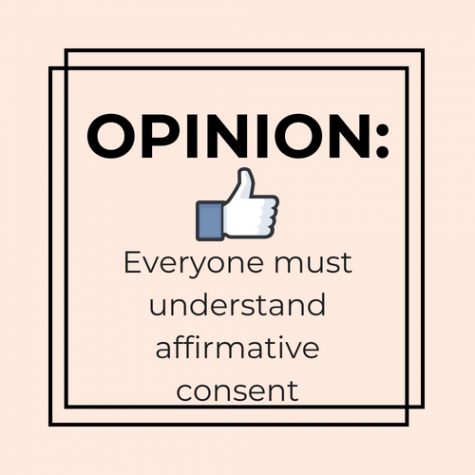Opinion: Everyone must understand affirmative consent
July 17, 2018

If you’ve been around bus stops, or have even tried registering for classes at UNF, you’ve probably encountered Title IX. Though the focus is on gender discrimination awareness, there is a part discussing consent, mainly in terms of sexual activity. With recent conversations centering around consent (such as the #MeToo movement), it is time for an in-depth analysis of what it is and what it entails.
What is consent? According to the Merriam-Webster dictionary, it is defined as giving “assent or approval.” The same definition can be kept about affirmative sexual consent: there must be explicit and vocal permission to interact sexually after mutual agreements were made and understood by the involved parties. Consent is not given through gestures, clothing, signals or anything of the sort, but it can be taken away by those means.
What one should also keep in mind is that consent should never be forced. Rather, it should be given with full knowledge of what’s to come. It must be considerate and precise. Also, it is crucial to remember that consent should be reversible (meaning someone can change their mind). Finally, affirmative consent should be given or taken sober and with zero influences.
Generally speaking, affirmative consent is linked with sexual assault/abuse or rape of women. It makes sense, as one out of every six women in the U.S. have been victimized. Sexual violence against women receives more attention, so their stories are discussed and are published more.
However, such horrific experiences also happen to men, as one in 33 men will experience assault in their life. Members of the LGBTQ+ community are also victimized at a rate of 21 percent. These conversations barely ever mention the TGQN (transgender, genderqueer, nonconforming).
It is only acceptable if consent is asked and given every time. There are severe physical, as well as psychological, consequences to nonconsenting activities on the victims.
It is evident that, if reported and invested, sexual violence will lead to jail time, or worse, social shame. It is unfortunate to note that there are several states without consent-defining laws, or “Yes Means Yes” laws. Therefore, it is crucial that we all cultivate a culture of encouragement and support if we know anyone who has been victimized, or if we’ve been victims ourselves. We must make it the norm to denounce unsolicited behaviors and contact law enforcement when necessary.
Therefore, regardless of what you identify as, it is important that everyone understands what affirmative consent is, as well as its functions: it’s common decency, respect and understanding of the other person, and ultimately of yourself. To reiterate, sex (with penetration) without consent is rape, unwanted words or remarks are harassment, and unwanted touch is sexual assault.
Therefore, keep in mind that consent is absolutely necessary for everyone’s safety. It doesn’t have to be strange and uncomfortable, it can shift or change, and it is a good behavior to cultivate.
For more information about sex education and anything related to this topic, visit the UNF Women’s Center in Bldg. 2 Suite 2100, or give a call at their 24-hour crisis helpline (904-620-1010).
You can also visit the UNF Counseling Center in Bldg. 2, Rm. 2300, or call to schedule a session (904-620-2602).
—
For more information or news tips, or if you see an error in this story or have any compliments or concerns, contact [email protected].






















